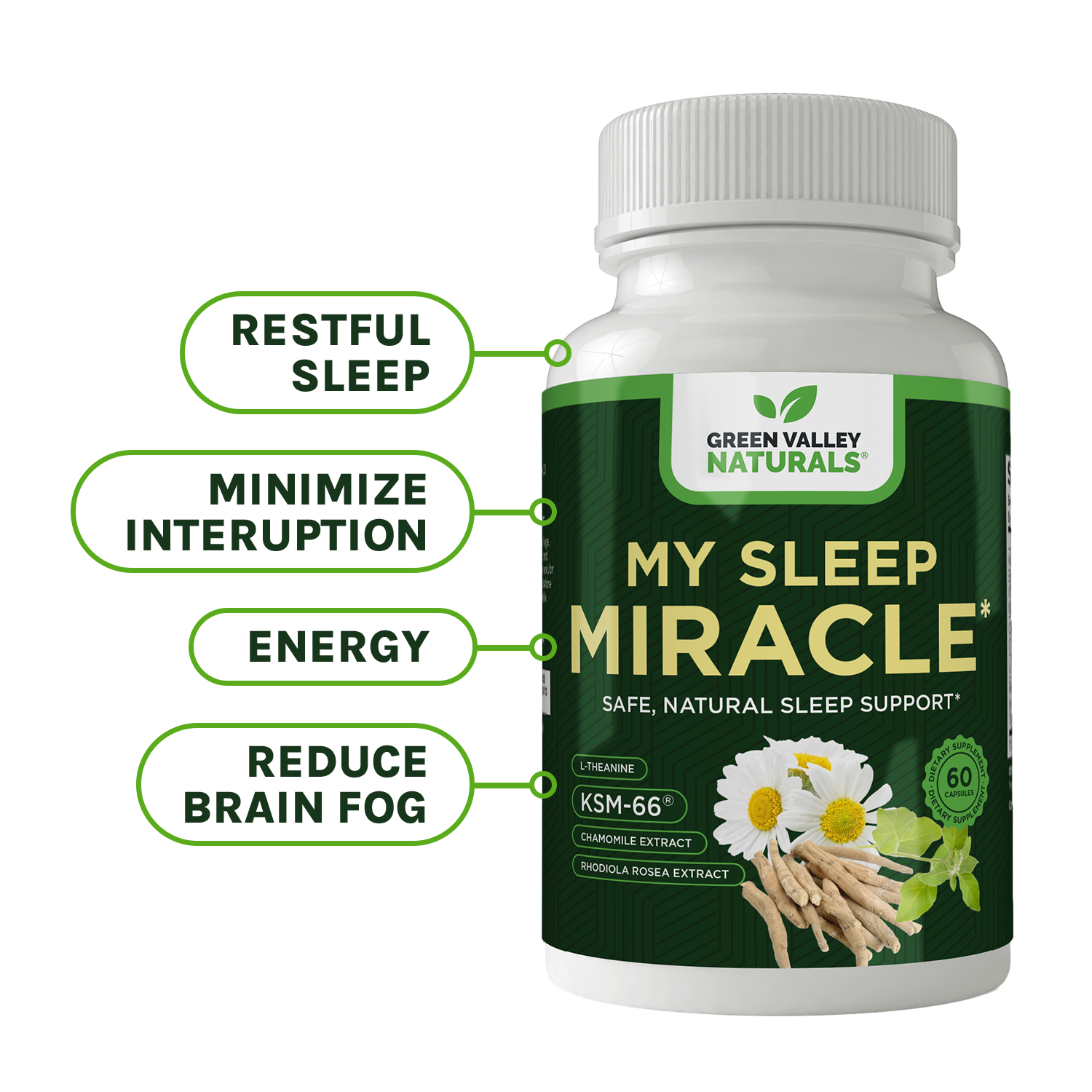My Sleep Miracle
Safe, Natural Sleep Support...
Key Ingredients

L-Theanine
Found in green tea, L-theanine is known for its relaxing and calming effects. It helps balance brain waves, particularly by increasing alpha wave production, which induces relaxation without causing drowsiness. It's beneficial for reducing stress and improving focus and is also used to promote healthy blood pressure levels and support immune function.

Chamomile Extract (flower) (1.2% Apigenin)
Chamomile is a traditional herb known for its calming and sleep-inducing properties. It works by promoting the release of GABA, a neurotransmitter that helps reduce over-excitement in the brain and aids relaxation. Chamomile is often used to ease stress, improve sleep quality, and even support digestive health.

KSM-66® Organic Ashwagandha Extract (Withania somnifera) (root) (5% withanolides) (Less than 0.1% Withaferin A)
This is a highly concentrated form of Ashwagandha, a well-known adaptogenic herb used for centuries in Ayurvedic medicine. It is believed to lower cortisol levels, which helps in reducing stress and improving sleep quality. It also supports memory, brainpower, immune function, and overall health.

Rhodiola Rosea Extract (root) (standardized to 3% rosavins, 1% salidrosides)
Rhodiola Rosea Extract (root) standardized to 3% rosavins and 1% salidrosides is a powerful adaptogenic herb that enhances the body’s resilience to stress. By modulating the stress response and reducing the negative effects of stress hormones, it promotes a sense of calm and well-being. Clinical studies confirm its efficacy in reducing fatigue, improving cognitive function, and enhancing physical performance. With additional benefits for memory, mood, and cellular health, Rhodiola Rosea is an essential ingredient for those seeking a natural solution to stress management and overall health optimization.
Frequently Asked Questions
Your health is our top priority
Here at Green Valley, we only work with US-based manufacturing facilities that are cGMP (Good Manufacturing Practices) compliant and FDA inspected.
Our products are triple tested by our manufacturers to ensure potency and purity and are stored in our temperature and humidity-controlled warehouse right here in the Shenandoah Valley, Virginia. And we ship directly to your doorstep – we don’t share warehouse space and we don’t hand off your business to a third party to fulfill your order.
Best of all, all Green Valley products come with our 90-day Satisfaction Guarantee. If you are unhappy with the product for any reason, simply call or email our customer support team and return the unused portion of the product within 90 days of your order. We’ll refund every penny of your purchase (less shipping), no questions asked!

My Sleep Miracle Customer Reviews
More often than not, my husband was getting up every night, unable to breathe! Maybe we had to kick our cats out at bedtime when they love to cuddle us? Just when we had tried so many other ways to help him, I saw the advertisement for your Green Valley health products
More often than not, my husband was getting up every night, unable to breathe! Maybe we had to kick our cats out at bedtime when they love to cuddle us? Just when we had tried so many other ways to help him, I saw the advertisement for your Green Valley health products. It took a few weeks but now my husband can get the restful sleep he needs once again! Thanks so much! This is life changing for us both!
For about 6 months, My Sleep Miracle puts me to sleep in about 30 minutes and I stay asleep all night
For about 6 months, My Sleep Miracle puts me to sleep in about 30 minutes and I stay asleep all night. I'm thankful to fall asleep so quickly and feel both rested and energized in the morning. My sleep miracle allows me to accomplish more at work as well as having energy to do my hobbies in the early evenings. My sleep miracle is effective whereas the others were not. I started seeing results after about 3 weeks and have been consistently taking it for about six months. I recommended it to a friend.







